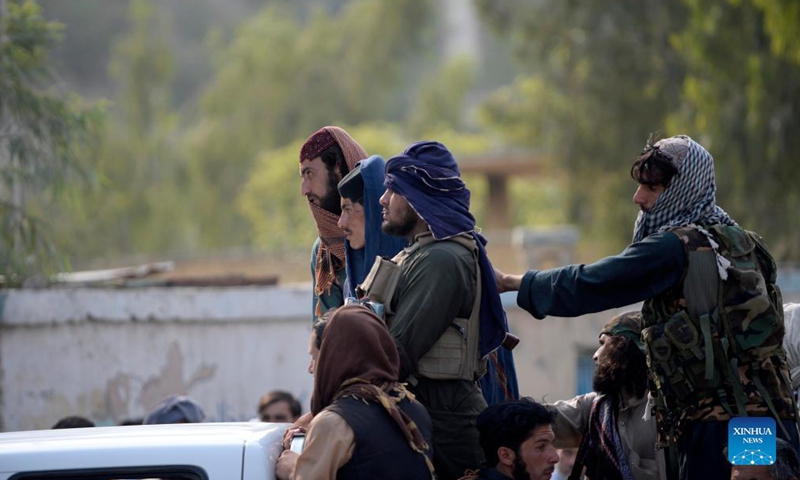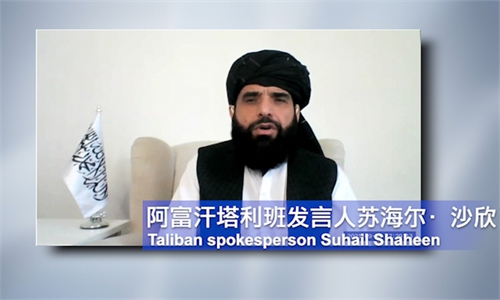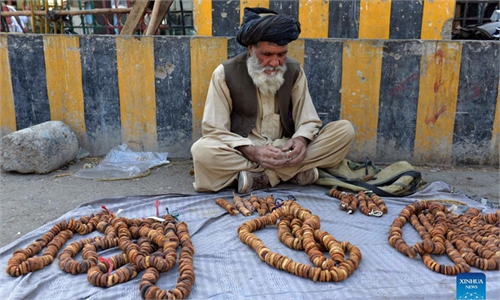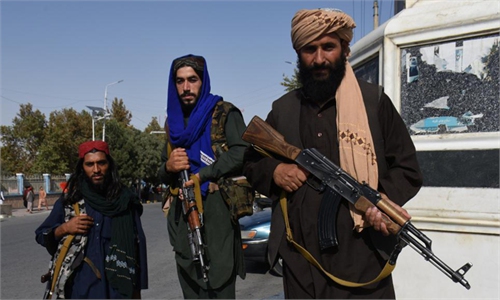
Afghan Taliban members patrol on Afghan side of the border near the border crossing point of Torkham between Pakistan and Afghanistan on Sep 3, 2021.Photo:Xinhua
By claiming it has close ties with the Afghan Taliban and no hostility toward China, the Tehrik-e Taliban Pakistan (TTP) is hoping to improve its circumstances following the Taliban's takeover of Afghanistan, analysts said. But they warned that the TTP may continue its attacks in Pakistan and cause damage to China's projects and personnel in the country.
In an exclusive interview with Japanese media outlet Mainichi Shimbun, TTP leader Mufti Wali Noor Mehsud welcomed the Taliban's return to power in Afghanistan after 20 years of absence and said that "we are hopeful for a strong relationship between the two of us."
Regarding the TTP's ties with the Afghan Taliban, Mehsud said that the relationship is "cordial and like a brotherhood." But he denied there was any collaboration.
The TTP, established in 2007, is an alliance of militant groups based in northwest Pakistan near the border with Afghanistan. The Mainichi Shimbun said that the Afghan Taliban and the TTP are "known to share the ideal of governing by Sharia, or Islamic law."
The remarks showed that the TTP hopes to benefit from the Afghan Taliban's takeover as they are both Pashtuns and the Afghan Taliban's victory represents a victory for Pashtuns and Islamism, Zhang Jiadong, a professor at the Center for American Studies, Fudan University, told the Global Times.
Encouraged by the Afghan Taliban's victory, the TTP wants to realize Pashtuns' rule in Pakistan. This is an issue of concern for the Pakistan government, Zhang said, noting that the resurgence of extremist groups in the region may affect the regional situation and more problems may emerge after the US withdrawal.
Zhu Yongbiao, director of the Center for Afghanistan Studies at Lanzhou University, said that the TTP leaders' remarks showed that while the Afghan Taliban wants to cut ties with the TTP, the TTP wants the opposite.
The TTP is trying to say, "if you can receive the Afghan Taliban, why not accept its brother?" Zhu said.
Although the Afghan Taliban has close ties with the TTP in terms of its origins and development, they differ from each other in political goals and approaches in realizing the goals. They are now viewed as two different groups.
Relations between the TTP and the Afghan Taliban are very complicated. British colonists previously allocated a large amount of land from Afghanistan to Pakistan, which is why there are a large number of Pashtuns in Pakistan. As a result, many Pashtuns in Pakistan joined the Afghan Taliban when it was established and some even became founding members, Zhu said.
But as the situation changed, divergences emerged and some Pashtuns from Pakistan left the Afghan Taliban and returned to Pakistan to found their own organization.
Zhu noted that the TTP has absorbed many anti-Pakistan militants including other ethnic groups and international terrorist forces. It differs from the Afghan Taliban in its goals and attitude toward the Pakistan government.
In 2009, the Afghan Taliban denied having ties with the TTP and released statements to openly condemn the TTP's attacks on civilians. However, observers noted that some Afghan Taliban members have sympathy toward the TTP.
Zhu pointed out that there are some links between the Afghan Taliban and the TTP in personnel exchanges. Some members of the TTP also helped the Taliban to fight the former Afghan government. But it is hard to figure out whether these people joined the Taliban as individuals or as a group.
But it is clear that the Afghan Taliban does not want to develop official ties with the TTP, and nor does it want to be involved in the struggle between the TTP and the Pakistan government.
Experts reached by the Global Times noted that the complicated relations between the Afghan Taliban, the Pakistan government and the TTP may become more delicate following the Taliban's takeover in Afghanistan, which may also influence geopolitics in South Asia.
Zhu noted that Pakistan has two main concerns over this: first, whether the victory of the Taliban in Afghanistan might stimulate the TTP and boost its confidence; and second, whether there will be stronger nationalism among the Pashtuns in Pakistan, which could lead to requests for territory.
Zhang warned it is possible that the TTP may conduct more activities in Pakistan and more Chinese people or Chinese projects may be attacked in order to increase pressure on the Pakistan government.
During the interview with the Mainichi Shimbun, Mehsud claimed that there is "no hostility between the TTP and China." But he warned the Chinese government and its people "not to be influenced by Pakistan's conspiracies and deception, and to avoid initiating a war against the TTP."
However, Qian Feng, director of the research department at the National Strategy Institute at Tsinghua University, said that the TTP is playing tricks to confuse the international community and its leader's remarks cannot disguise the fact that the TTP is a terrorist group. Neither can it hide the fact that the TTP conducted terror attacks targeting Chinese people in Pakistan, Qian said, adding that the international community should work together to crack down on such terrorist organizations.
The Afghan Taliban may try to cut ties with the TTP, Qian noted.

Photo:AFP
Nine Chinese nationals were killed in a shuttle bus explosion in Pakistan's Khyber Pakhtunkhwa province on July 14 on their way to the China-backed Dasu hydropower project.
The Pakistan government announced an investigation and said the suicide attack was carried out by a branch of the TTP backed by Indian and Afghan intelligence agencies. But the TTP later denied responsibility for the Dasu attack.
Chinese Foreign Ministry spokesperson Zhao Lijian told a press conference on July 19 that the TTP is considered a terrorist organization by the Pakistani government and the international community believes that it was behind many terrorist attacks including the bombing of a hotel in the Pakistani city of Quetta on April 21, which took place when the Chinese ambassador was about to arrive at the hotel.
Both Zhang and Zhu noted that China need to work with the Pakistan government to strengthen security measures and ensure the safety of projects in the China-Pakistan Economic Corridor (CPEC).
The negative media reports in the Western media that smear these projects should also be countered, and more people should be made aware that the CPEC can help to improve people's livelihoods in Pakistan.





